We're an affiliate
We hope you love the products we recommend! Just so you know, we may collect a share of sales or other compensation from the links on this page at no additional cost to you. Thank you if you use our links, we really appreciate it!
The Cane Corso, pronounced kha-neh kor-so, is an Italian Mastiff dog widely famed for their powerful jaws and strong muscles.
These large and powerfully-built dogs were initially used to protect livestock and hunt large game in the Italian Peninsula.
With a confident stature backed by power and vigilance, Cani Corsi (plural for Cane Corso) are not the right fit for everyone because they demand consistent training and enrichment.
In this guide, you will learn everything you need to know about Cane Corso dog breed info, from their ancient history in Rome to their lovely personal traits.
A Brief History of Cane Corso
The Cane Corso can trace their origins back in Italy where they were used as massive guard dogs by the early inhabitants of Rome.
The Cane Corso comes from a lineage of an ancient Mastiff-type dog known as Molossus, who were crossbred with a similar Mastiff breed.
During the Roman era, the Cani Corsi were greatly used as guard dogs, war dogs, herding dogs, and skilled hunters for various large games.
Share-cropping and the massive mechanization of agriculture saw the massive decline of Cani Corsi which nearly led to their extinction.
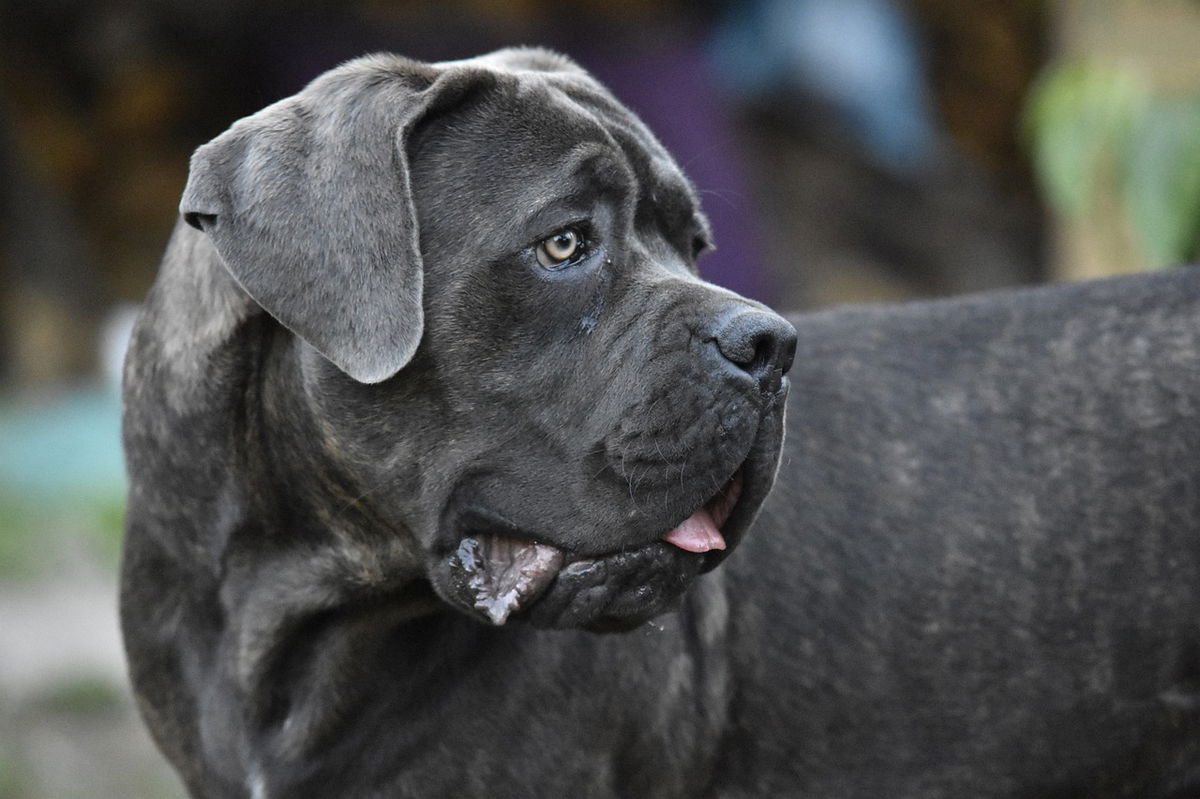
Luckily enough, Cane Corso’s was revived by a small number of canine enthusiasts in the 1970s through selective breeding of the surviving Cani Corsi.
A Neapolitan Mastiff breeder known as Michael Sottile is credited for being the first person to import Cane Corso puppies into the United States from Sicily in the year 1988.
The American Kennel Club (AKC) recognized the Cane Corso in their working group of dogs in 2010 after an appeal from the International Cane Corso Association.
Our modern-day Cani Corsi has consistently been ranked among America’s popular dog breeds according to AKC’s registry.
5 Interesting Facts About Cane Corso
1. Cani Corsi are hard workers
The Cane Corso thrives when given something constructive to do. They have the physical stamina and mental acumen to excel in trained jobs including working on farms.
These muscular dogs are not couch potatoes. They enjoy running, getting busy, and participating in interactive games with their trusted humans.
Cani Corsi have also been shown to excel in dog sports such as agility courses, obstacle courses, tracking, and scent work.
2. The Cane Corso nearly became extinct
Cane Corso nearly became extinct during the mid-20th century when the agricultural sector was mechanized, since farmers didn’t need working dogs anymore.
This trend worried a few canine fanciers who pulled resources in the 1970s and selectively bred the remaining Cani Corsi to keep their lineage alive.
In 1983, the official breed club in Italy known as the Società Amatori Cane Corso was formed and they eventually sought recognition from the Italian Kennel Club, which was granted in 1994.
3. The Cani Corsi is loyal and highly sociable
These large dogs have a long-held reputation for being tough to handle, but beyond their imposing appearance lies a large teddy bear at heart.
Cani Corso is highly affectionate and they can form unbreakable bonds with their human families. They hardly want to stay where their owners are not present.
However, you need to socialize and train your Cane Corso from a young age to bring out their softer side and make them excellent companions.
4. Cane Corso roughly means ‘bodyguard-dog’
The breed’s name Cane Corso is of Latin descent and it can be loosely translated to mean Bodyguard dog.
The word ‘Cane’ comes from Canis meaning dog, and the word Corso is derived from Cahors meaning ‘guardian’ or ‘protector’.
5. Cane Corso’s lifespan can be linked to their color
It may come as a surprise that Cani Corsi’s longevity can be linked to their hair color.
According to a recent study involving 232 dogs from 25 countries, Black Brindle Cani Corsi have been shown to live longer than the other group.
Black Brindle colored Cani Corsi showed a medium lifespan of 10.30 years, which is above the average longevity (9.29 years) shown by the whole group.
Cane Corso Puppies
Cani Corsi puppies are a delight for people who are ready to train and provide them with enough opportunities to play.
Before bringing your Cane Corso puppy home, you may want to invest in a few essential dog accessories to make things ready for them.
One or two dog crates, a cozy sleeping area, and a few food bowls will do the trick in making your puppy contended.
You’ll also want to fence your yard since your Cane Corso puppy can be active and it’s good to keep them contained.
It’s always prudent to wait until your puppy receives all their core vaccines before taking them outdoors. This is a preventive measure for pathogens and canine communicable diseases.
Cane Corso Physical Characteristics
Size and Weight Range
A fully grown male Cane Corso has an average shoulder height of 24 – 28 inches while their female counterparts have a median height of between 23 – 26 inches.
The individual dog’s weight is always proportionate to their height, but in general, an adult healthy male weighs 90 – 120 pounds, while a female Cane Corso has an average weight of 80 – 100 pounds.
Coat Color and Texture
Despite being short-furred the Cani Corsi have a double-layered coat which consists of a coarse top coat and a dense undercoat.
The acceptable colors of Cani Corsi dogs are red, gray, fawn, black, and gray. Shades of brindle can be seen in all colors with white patches on their chest and toe tips.
Distinctive features
One of the top highlights of the Cane Corse is their large square-shaped head and muzzle, which forms the hallmark of the breed.
These large-sized dogs have a striking set of almond-shaped eyes which adds to their confident looks and alert expression.
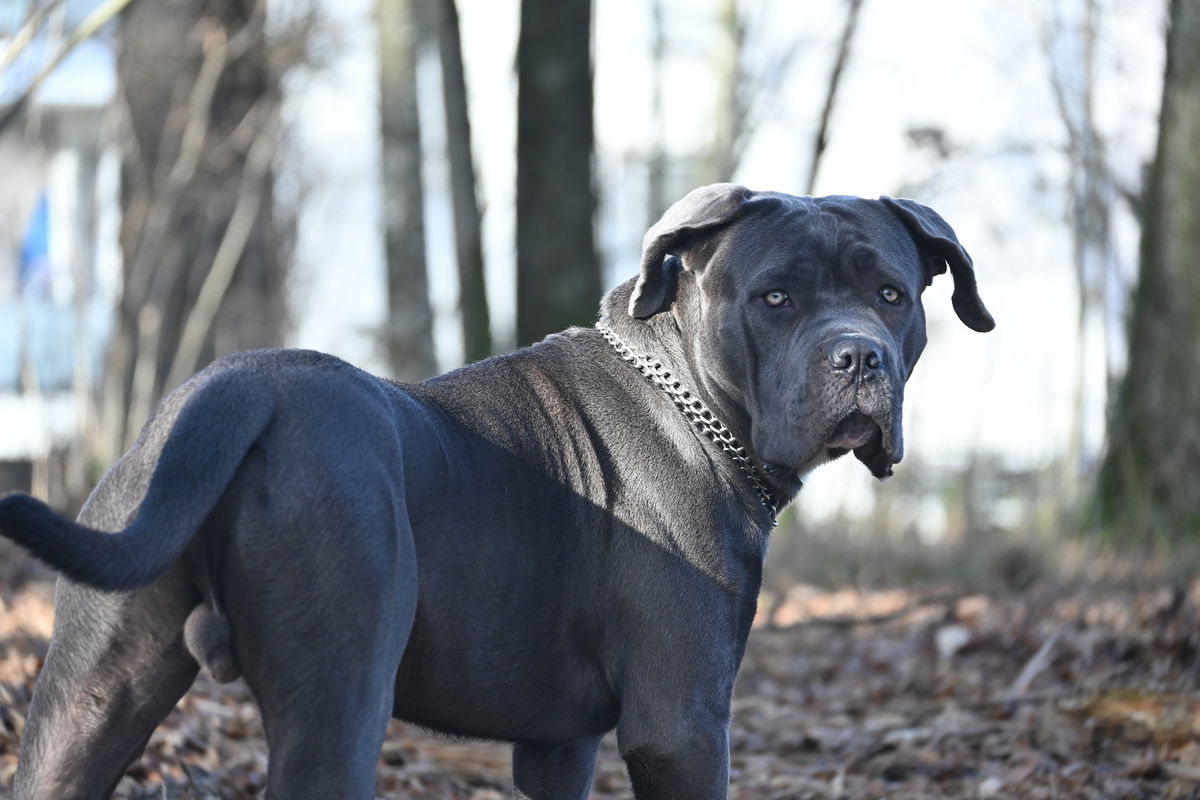
The Cane Corso’s athletic and well-developed muscles are another top distinguishing trait that makes these dogs a favorable choice for active families.
Traditionally, Cani Corsi had their tails docked at the fourth vertebra for both practicality and aesthetic reasons.
However, with continuous adoption of animal welfare, it’s more common to find a Cane Corso with an erect full tail, not curled.
Cane Corso Temperament and Personality
The Cane Corso dogs have a reserved and stable temperament which makes them a good fit for many households.
These dogs can also be vigorous, a personality that makes them ready to meet any challenge put on their way.
A well-trained Corso builds strong affection towards their human family, including children. However, you should teach your kids how to interact with dogs to ensure a harmonious living.
Novice dog owners should be prepared to handle a large canine when thinking about adopting a Cane Corso.
Keep in mind that these dogs have a bossy nature, so they need a focused owner who can create boundaries and provide efficient leadership.
Your beloved Cane Corso may test your patience to see how far you can tolerate it. It’s prudent to let them know about your house rules from a young age.
Cane Corso Intelligence
Cani Corsi are smart dogs with an above-average obedience and work rating. These loyal canines are eager to learn making them a favorable breed to train.
Their incredible brain power makes them quick learners who can be trained for various working roles such as tracking, guarding, and search and rescue.
Cane Corso Health and Lifespan
Average Lifespan
As we pointed out earlier, Cane Corso’s longevity can be affected by their coat color, this is according to a recent study involving more than 200 dogs.
But in general, the average life expectancy of most Cani Corsi is about 9 – 11 years, with some individual dogs living past this range.
Providing your canine friend with proper care and putting them in a stress-free environment can greatly contribute to increasing their longevity.
Common health issues and genetic disorders
Cani Corsi are generally healthy dogs, although they can be predisposed to certain health conditions due to poor breeding.
Not all Can Corso will suffer any or all of these conditions, although it’s always good to be in the know when considering this breed.
Some of the common health problems and genetic disorders for Cane Corso include:
- Bloat
- Hip Dysplasia
- Elbow Dysplasia
- Allergies
- Cancers
- Heart diseases
- Eye conditions
Preventative measures for good health
You can reduce the chances of genetic disorders by working with responsible breeders when you want to purchase a Cane Corso.
Responsible breeders prioritize the health and temperament of the upcoming puppies by breeding healthy parents.
Be sure to ask as many questions as possible about the health of your desired puppy’s parents before exchanging your money with any breeder.
Common red flags you need watch out for is if the breeder operates a puppy mill or if they fail to provide sufficient paperwork.
You should plan regular visits to your vet for physical exams and medical checkups. This will allow the vet to detect any unusual condition in good time and prescribe timely treatment.
While at the vet, enquire about preventive medication such as vaccination and flea treatment. This will strengthen your puppy’s defense against common communicable diseases.
Providing a high-quality dog food diet with strict portion control will keep your dog well-nourished and energized.
In addition to good food, you should take your Cane Corso out for regular exercise and offer corresponding mental stimulation.
This will keep your furry friend in healthy weight and prevent them from adding too much weight or tending to obesity.
Cane Corso and Allergies
Being double-coated canines, the Cani Corsi shed low to moderate amounts of fur throughout the year. Increased hair fall is witnessed twice a year during seasonal changes in fall and spring.
This makes it good for allergy-prone individuals to take cautionary measures when parenting this large dog breed.

People with allergies need to groom their Cani Corsi and ensure their home atmosphere is kept moist to prevent dust and pet fur from floating in the air.
Caution needs to be taken for other allergens including dog saliva and urine by ensuring the house is always kept clean.
Cane Corso Grooming Needs
The short fur on Cani Corsi’s double coat makes them a fairly easy-to-maintain dog breed. A weekly brush using a curry comb is needed to remove dead fur and prevent the coat from matting.
These dogs don’t need frequent baths, so you can shower them once a month or when needed. Use canine-specific shampoo and warm water when washing your dog.
If your dog’s nails are clicking on the floor, then they’re overgrown and you need to trim them using nail clippers or Dremel tools.
Caution should be taken during nail care since dogs’ nails have a blood vessel section known as the quick.
If you need to figure out where your dog’s quick begins, you can ask your vet or take them to a professional groomer for trimming.
Wipe your dog’s ears with a soft cotton ball dipped into a pH-balanced ear-cleaning solution to prevent ear infections.
Be gentle when working on your dog’s ears and do not insert anything into the ear canal.
Brush your dog’s teeth daily using a canine toothpaste and a soft toothbrush. Keeping the teeth clean will prevent dental diseases and other related oral conditions such as halitosis.
For a better experience, you should begin grooming your dog at home right from their puppyhood years and work your way into their adult life.
By getting your dog accustomed to brushing and being examined, they are most likely going to remain calm during the grooming exercise.
You can make the experience better for your Cane Corso by using praises and high-value treat rewards. This will make them look forward to the upcoming grooming sessions.
As you groom your dog, it’s a good idea to inspect their skin for rashes, hotspots, sores, and external parasites.
Cane Corso Exercise and Activity Levels
Daily Activity needs
Being a large, athletic dog, Cani Corsi needs consistent vigorous physical activities and mental stimulation for about 2 hours every day.
Keep in mind that the Cane Corso was bred for a physically demanding job, so they have enough energy reserves that need to be channeled in constructive ways.
The exact amount to exercise your dog can vary from one to another depending on several factors including age and underlying health conditions.
Failure to provide your Corso with enough work to do may cause them to seek ways of self-entertainment, most of which are destructive.
Suitable activities and games for Cani Corsi
A morning brisk walk or run for a mile and a corresponding walk in the evening is a good starting point to maintain your dog’s muscles and tone.
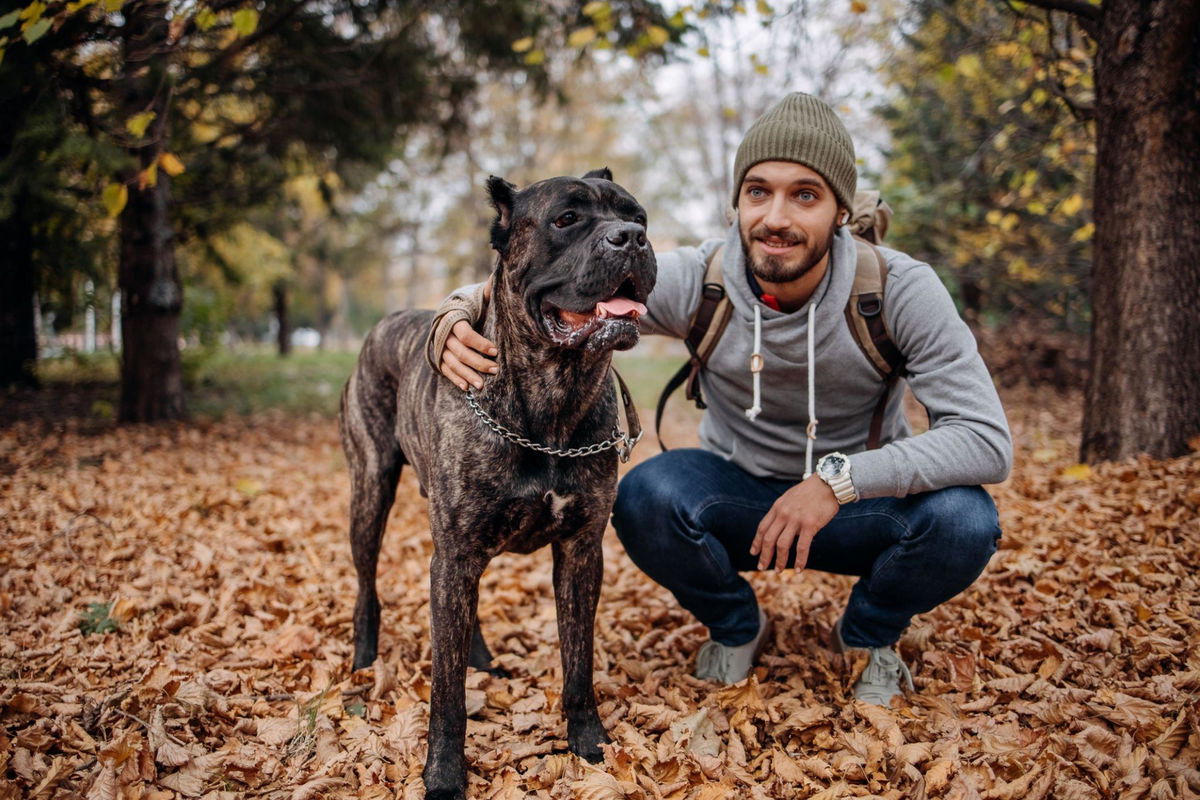
Cani Corsi will gladly join their human family in long runs, bicycle rides, and hikes among other vigorous activities.
You can also achieve your dog’s demands for physical exertion by throwing a flying disk and playing fetch with them in your backyard.
Importance of mental stimulation
- Tagging your lovely canine friend for an interactive play is good enough to strengthen your bond and make the relationship even better.
- Brain-taxing games are also helpful in reducing mental decline in dogs and preventing the risk of canine dementia in senior Cane Corso.
- Keeping your dog’s intellect engaged in constructive work is a good way of reducing boredom and anxiety-related disorders.
- Puzzle games and other mental stimulating activities can greatly improve your dog’s judgment and problem-solving abilities.
Cane Corso Training and Socialization
All dogs need proper training and consistent socialization, but more especially for large and athletic dogs like Cani Corsi.
It helps to enroll your Corso puppy into an obedience class while they are still young. This forms a good foundation for your new dog and allows them to socialize with other like-minded puppies.
Cane Corso can thrive in an active family, so you need to teach them how to blend with every member including children.
You should potty train your puppy as early as possible by teaching them to eliminate in certain spots in your backyard.
Positive reinforcement can work wonders in instilling good habits in your dog, so be sure to use these techniques.
Never use harsh training techniques on dogs such as the Cane Corso, since this can instill fear-based aggression and destructive behavior.
As your dog is transitioning into adulthood, you should socialize them with different animals and people to make them adjusted and well-mannered.
It’s good to monitor your dog when meeting new people and always take the precautionary step of having them on a leash.
Cane Corso Living Conditions
Being powerful athletic dogs, Cani Corsi can do well in large houses with a fenced backyard for physical exertion.
Your Cane Corso will thank you for a fully furnished outdoor kennel since it provides them with ample space to rest and play when needed.
Remember to keep your dog indoors when the temperatures get extreme during the winter and summer.
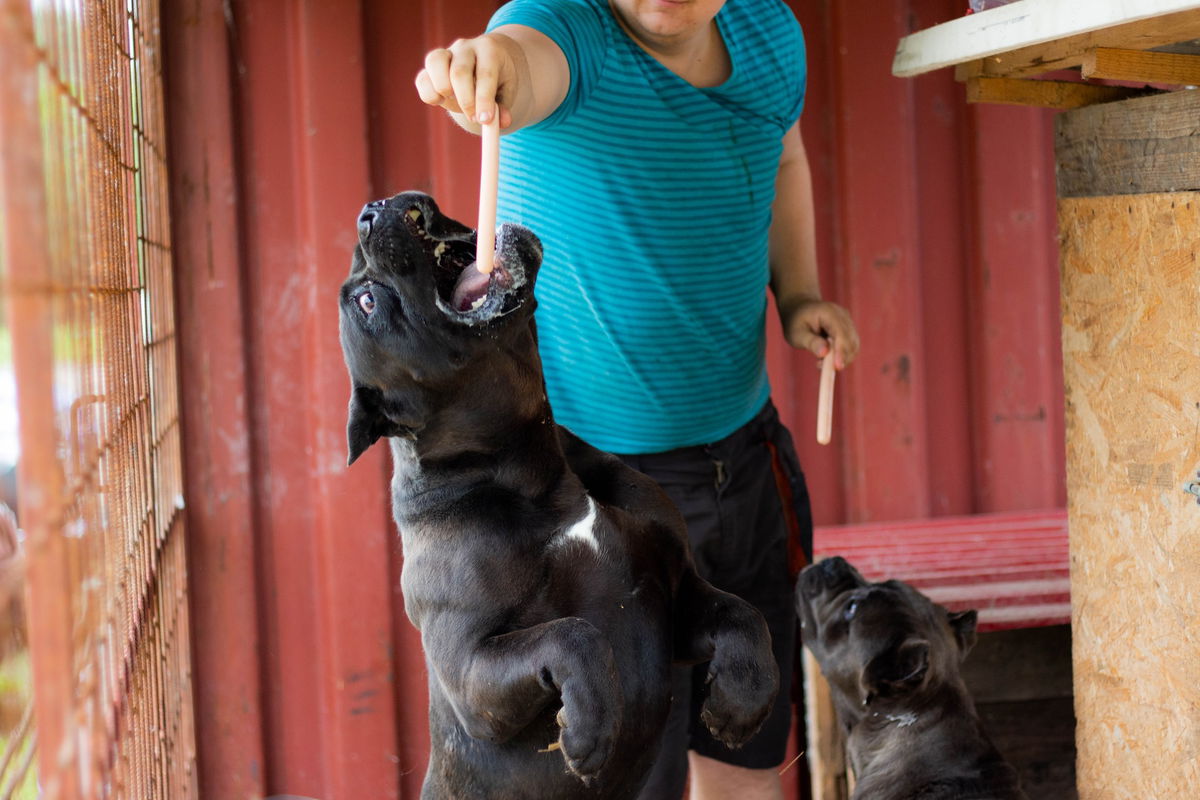
Apartment-dwellers are not left out, these imposing canines are soft at heart and they can adapt to smaller living conditions too.
All you need is to make sure your Cane Corso gets enough time to exercise every day. You can plan a morning or evening walk around your neighborhood and take them to the doggy park for the weekend.
Cane Corso Diet and Nutrition
Care should be taken when providing food for your Cane Corso to ensure they don’t put up too much weight.
Too much food and inappropriate diets can cause chronic weight-related problems and the development of bones in large dogs like Corsi.
The exact food type and amount your Cane Corso needs will depend on their dietary needs and underlying health conditions.
Large breed dogs can do well with raw animal protein diets such as chicken and beef. Remember to include suitable amounts of vegetables and fruits to balance your Corso’s nourishment needs.
Ask your vet nutritionist about the dietary needs including food type, and portion control to keep your Corso at a healthy weight.
If your Cane Corso gobbles down their meals faster, you can invest in elevated dog bowls to slow down their eating speed.
Too much eating can cause the dog to swallow food with air and predispose them to bloating. Food bowls with inserts (slow feeders) can also control your dog’s feeding rate.
Have enough water points in your home filled with clean drinking water for your Cane Corso’s health and wellness.
Cane Corso Pregnancy and litter size
The average gestation period for Cani Corsi is about 63 days, and you can expect a litter of 4 to 6 puppies depending on several factors.
Proper prenatal care, regular vet visits, and keeping your pregnant Cane Corso in a stress-free environment can greatly improve the whelping process and health of the upcoming puppies.
Conclusion
Despite their imposing outward appearance, the Cane Corso is a loyal and easy-going household pet companion.
As a responsible pet parent, be prepared to show your Cane Corso lots of love and provide them with a job to do.
Understanding the Cane Corso dog breed info such as their grooming and exercise needs is a huge step in tuning these giant dogs into proper household companions.
These large dogs will appreciate a huge living space with spacious backyards, but they are calm enough to live quite happily in a smaller space.
Laura is the founder of Furs'n'Paws. She is a also a pet writer and expert with more than 20 years of experience of working with dogs and cats. She developed a very strong love for animals at a young age. Her passion led her to establish a thriving pet sitting and dog walking business in Dubai. As an expert in pet training, behavior, and nutrition, Laura is committed to helping pet owners and pet lovers by offering high-quality information on a wide range of topics.


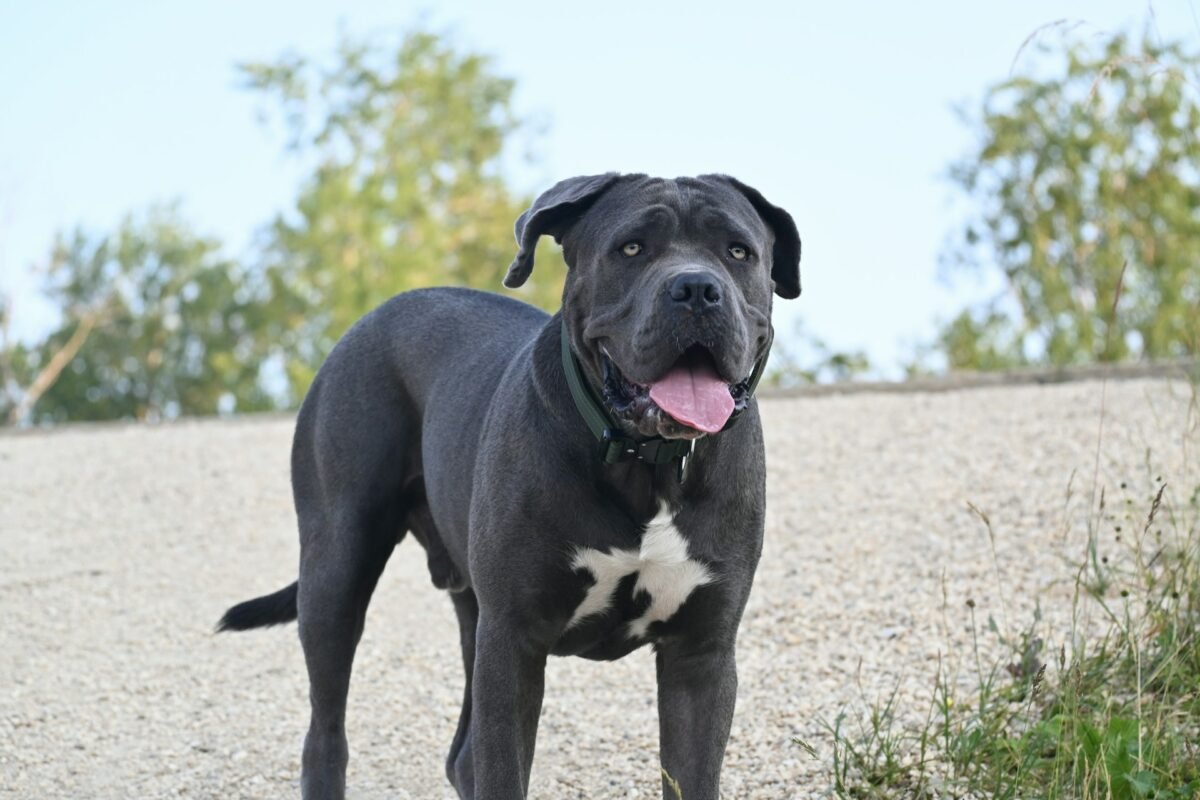
No responses yet